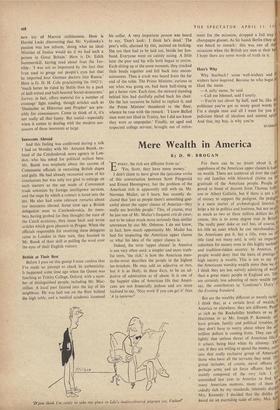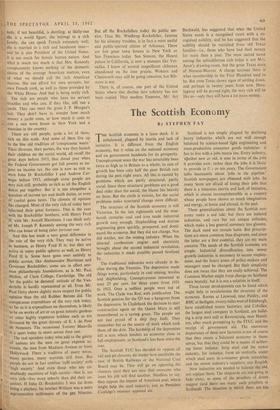Mere Wealth in America
By D. W. BROGAN
RNEST, the rich are different from us.'
'Yes, Scott, they have more money.'
I don't claim to have given the ipsissima verba of this conversation between Scott Fitzgerald and Ernest Hemingway, but the problem of the American rich is apparently still with us. Mr. Norman Mailer, so I learn, has recently de- clared that 'just as people there's something god- awful about the upper classes of America—they really are horrible people.' This, of course, may be just one of Mr. Mailer's frequent cris de cceur, not to be taken much more seriously than similar utterances by our Mr. Osborne. I do not know, in fact, how much opportunity Mr. Mailer has had for inspecting the American upper classes or what his idea of the upper classes is.
Indeed, the term 'upper classes' in America is not very often used; a simpler and more truth- ful term, 'the rich,' is how the American man- in-the-street describes the people in the highest tax-brackets. He may add an adjective or two, but it is as likely, in these days, to be an ad- jective of admiration as of abuse. It is one of the happier sides of American life that Ameri- cans are not financially jealous and are more inclined to say, 'Nice work if you can get it' than 'A la lanternel For there can be no doubt about it, ll$ uppishness of the American upper classes is ba 4 on wealth. There are scattered all over the cotol" try old families with historical claims on lht gratitude of the American people. People tifl proud to boast of descent from Thomas Jell' son or Albert Gallatin, but if there is not a lot of money to support the pedigree, the pedig is a mere matter of archaeological interest. helps a bit in politics and business, but not flea as much as two or three million dollars do. course, this is to some degree true in Britt The really poor duke or earl has, of course, his title an asset which he can merchandise, the Americans put it, but a title, even an title (and not many are), is only an imperf substitute for money even in this highly snobb and tradition-ridden country. In America, f people would deny that the basis of prestige high society is wealth. This is not to say II the Americans worship wealth more than we I think they are less naïvely admiring of wet than a great many people in England are. TI are certainly less admiring of mere wealth thl say, the contributors to 'Londoner's Diary' the Evening Standard.
But are the wealthy different or merely riche I think that, at a certain level of wealth, America or elsewhere, they are different. Peal as rich as the Rockefeller brothers or as Harriman or as Mr. Joseph P. Kennedy as have private, family and political troubles, t they don't have to worry about where the rte million dollars is coming from. They can to lightly that serious threat of American life ' it arises), being bled white bY alimony. 11 can, if they are willing to spend the money, mo into that really exclusive group of America' those who-have all the servants they need. It group includes, of course, naval officers al perhaps army and air force officers; but it mainly composed of the very rich. 1 astonished last year in America to find ho many American matrons, many of them cidedly rich by my standards, intensely dislila Mrs. Kennedy. I decided that the dislike W based on an ascending scale of envy. Mrs. ge
ee
rlY
01
irt at Id
511
nedy, if not beautiful, is dazzling; at thirty-one she is a world figure; she belongs to a rich family; she can speak French extremely well; she is married to a rich and handsome man— and he is also President of the United States; it is too much for female human nature. And What is much too much is that Mrs. Kennedy conspicuously knows nothing of the domestic chores of the average American matron, even of what we should call the rich American matron. She can afford her own servants, her own French cook, as well as those provided by the White House. And that is being really rich.
The rich are people, who have no servant troubles and who can, if they like, still run a yacht. They can meet the great J. P. Morgan's test. They don't have to wonder how much money a yacht costs, or how much it costs to run a vast town house in New York and a mansion in the country.
There are still people, quite a lot of them, rich on this scale. And some of them live up to the fine old tradition of 'conspicuous waste.' Their divorces, their parties, the way they launch their children on the social world., all recall the great days before 1913, that dread year when the Federal Government got full powers to im- pose an income tax. No one is now as rich as were John D. Rockefeller I and Andrew Car- negie before 1913, although some people are very rich still, probably as rich as all the English dukes put together. But it is not altogether a question of income tax and death duties, or even of capital gains taxes. The climate of opinion has changed. Most of the very rich of today have inherited their great fortunes. This is the case With the Rockefeller brothers; with Henry Ford II; with Mr. Averell Harriman. I can think only of Mr. Joseph P. Kennedy among the very rich who can boast of being faber fortunw sate.
And this has made a very great difference in the role of the very rich. They may be active in business, as Henry Ford II is; but they are active in many public spheres as well, as Henry Ford H is. Some have gone over entirely to public service, like Ambassador Harriman and Governor Rockefeller; some are in effect one- man philanthropic foundations, as is Mr. Paul Mellon, of Clare College, Cambridge. The old let the public be damned' attitude of the Van- derbilts is hardly represented at all. Even Mr. Paul Getty shows slightly more respect for public Opinion than the old Robber Barons did. The conspicuous expenditure of the very rich today, as far as it is expenditure on themselves, is likely to be on works of art or on great botanic gardens or other highly expensive hobbies such as are favoured by the great dynasty of E. I. du Pont de Nemours. The occasional Tommy Manville Is a sport today in more senses than one.
The real spenders today who add to the gaiety of nations are the men on great expense ac- counts, the men from Madison Avenue or from Hollywood. There a tradition of many wives, many parties, many scandals still lives. But People do not in fact confuse 'cafe society' with 'high society.' And even those who are un- doubtedly members of high society—that is, are very rich—live more soberly than did their an- cestors. If John D. Rockefeller I was far from being a playboy, his brother -William was a more representative millionaire of the gay Nineties. But all the Rockefellers today do public ser- vice. Thus Mr. Winthrop Rockefeller, famous for his alimony troubles, is in fact a most useful and public-spirited citizen of Arkansas. There are few great town houses in New York or San Francisco today. San Simeon, the Hearst palace in California, is now a museum like Ver- sailles. I know of several magnificent châteaux abandoned on the lone prairie. Woburn and Chatsworth may still be going concerns, but Bilt- more is not.
There is, of course, one part of the United States where this decline into sobriety has not been copied. That modern Emerson, Mr. Art Bucbwald, has suggested that what the United States needs is a recognised court with a re- cognised nobility, and he has suggested that the nobility should be recruited from old Texas families—i.e., those who have had their money for more than a year. The most sacred name among the splendiferous rich today is not Mrs. Astor's drawing-room, but the great Texas store of Nieman-Marcus. A charge account there is what membership in the Four Hundred used to be. But even Texas shows signs of settling down, and perhaps in twenty years from now, Hem- ingway will be proved right, the very rich will be like us—only they will have a lot more money.



































 Previous page
Previous page